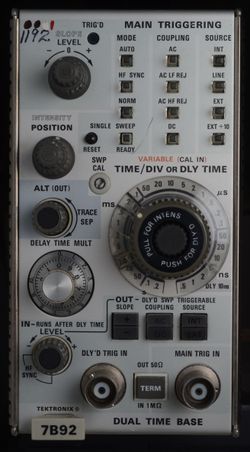7B92: Difference between revisions
No edit summary |
No edit summary |
||
| Line 40: | Line 40: | ||
The 7B92 uses a discrete trigger circuit containing [[152-0177-02]] [[tunnel diodes]]. | The 7B92 uses a discrete trigger circuit containing [[152-0177-02]] [[tunnel diodes]]. | ||
[https://vintagetek.org/years-at-tektronix-hofer/ | [https://vintagetek.org/years-at-tektronix-hofer/ Bruce Hofer recalls] investigating an issue where | ||
early 7B92 models exhibited sweep anomalies especially near the start of the sweep | early 7B92 models exhibited sweep anomalies especially near the start of the sweep. | ||
After trying to fix these he convinced management that a redesign was needed. | |||
This resulted in [[Patent US 4009399A]], the [[7B92A]] update, and the [[067-0657-00]] calibration fixture. | This resulted in [[Patent US 4009399A]], the [[7B92A]] update, and the [[067-0657-00]] calibration fixture. | ||
| Line 52: | Line 52: | ||
The effect of this jumper is only noticeable for sweep speeds of 20 μs/Div and faster, | The effect of this jumper is only noticeable for sweep speeds of 20 μs/Div and faster, | ||
since at those sweep speeds the smallest shunt capacitance is used on pin 8, and the holdoff time is minimal. | since at those sweep speeds the smallest shunt capacitance is used on pin 8, and the holdoff time is minimal. | ||
==Pictures== | ==Pictures== | ||
<gallery> | <gallery> | ||
Tek 7b92 front.jpg | 7B92 front | Tek 7b92 front.jpg | 7B92 front | ||
Tek 7b92 right.jpg | 7B92 right | Tek 7b92 right.jpg | 7B92 right | ||
Tek 7b92 left.jpg | 7B92 left | Tek 7b92 left.jpg | 7B92 left | ||
</gallery> | </gallery> | ||
{{Custom ICs| | {{Custom ICs|7B92}} | ||
[[Category:7000 series horizontal plugins]] | [[Category:7000 series horizontal plugins]] | ||
Revision as of 06:54, 16 May 2023
The Tektronix 7B92 is a 500 MHz dual timebase plug-in for 7000-series scopes. It was introduced along with the 7904 mainframe in 1972. In 1976, it was replaced by the 7B92A after some it was discovered that the 7B92's ramp generator had aberrations at the start-up of the sweep at the fastest sweep rates.
According to July 1971 Tekscope, the 7B92 was designed by Les Larson and Bill DeVey.
An "HF Sync" triggering mode is provided in which the trigger level control varies the frequency of a built-in oscillator to lock on to the input for input signals from 100 to 500 MHz, providing higher sensitivity than the direct trigger (which is specified up to 500 MHz as well).
Internal jumpers are provided to configure the 7B92 for operation in 7800/7900 vs. slower mainframes, and to select whether the variable control affects the delaying or the delayed time base.
As a dual time base, the 7B92 uses the top field in the display readout for the sweep speed of the main and the bottom field for the delayed time base. The delay time can only be read from the 10-turn analog dial.
The 7B92 has no magnifier function but its regular sweep dial setting reaches down to 500 ps/Div. It has no provision for X-Y operation.
Key Specifications
| Sweep speed | 0.5 ns/Div to 0.2 s/Div, 1−2−5 sequence (variable up to 0.5 s/Div) |
|---|---|
| Delay time | 0 to 9.9 Div |
| Triggering | 0.5 Div or 100 mV up to 20 MHz, 1 Div or 500 mV up to 600 MHz |
| Jitter | < 50 ps at 600 MHz |
| Ext Trig input | 1 MΩ // 20 pF or 50 Ω |
Internals
The 7B92 uses a discrete trigger circuit containing 152-0177-02 tunnel diodes.
Bruce Hofer recalls investigating an issue where early 7B92 models exhibited sweep anomalies especially near the start of the sweep. After trying to fix these he convinced management that a redesign was needed. This resulted in Patent US 4009399A, the 7B92A update, and the 067-0657-00 calibration fixture.
The internal jumper for mainframe selection (7800/7900/7100 vs. slower) increases the minimum holdoff time on the slower mainframe selection by adding a 214 pF capacitor, C307, to pin 8 of the sweep control IC 155-0049-xx in parallel to the existing capacitors. This increases the minimum pulse width of the holdoff signal on pin B4 so that the sweep logic of slower mainframes can handle it properly. The effect of this jumper is only noticeable for sweep speeds of 20 μs/Div and faster, since at those sweep speeds the smallest shunt capacitance is used on pin 8, and the holdoff time is minimal.
Pictures
-
7B92 front
-
7B92 right
-
7B92 left
Custom ICs used in the 7B92
| Page | Model | Part nos | Description | Designers | Used in |
|---|---|---|---|---|---|
| 155-0061-00 | M083 | 155-0061-00 • 155-0061-01 • 155-0061-02 | trigger amplifier | Hans Springer | 7B92 • 7B92A |

